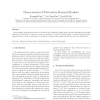203 search results - page 4 / 41 » Real Arguments Are Approximate Arguments |
NAACL
2004
13 years 8 months ago
2004
State-of-the-art pronoun interpretation systems rely predominantly on morphosyntactic contextual features. While the use of deep knowledge and inference to improve these models wo...
CPHYSICS
2007
13 years 7 months ago
2007
We investigate the financial network of the Korea Stock Exchange (KSE) using numerical simulations and scaling arguments. The frequency of degree and the edge density for a real ...
FSTTCS
2009
Springer
14 years 2 months ago
2009
Springer
We describe a simple iterative method for proving a variety of results in combinatorial optimization. It is inspired by Jain’s iterative rounding method (FOCS 1998) for designing...
SYNASC
2007
IEEE
14 years 1 months ago
2007
IEEE
Abstract. In this paper we give some applications of weakly Picard operators theory to linear positive approximation operators, to difference equations with deviating argument and...
IJCAI
2007
13 years 9 months ago
2007
Few existing argumentation frameworks are designed to deal with probabilistic knowledge, and none are designed to represent possibilistic knowledge, making them unsuitable for man...

